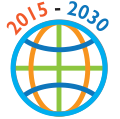 2030 agenda for sustainable development
2030 agenda for sustainable development
The global development agenda impacts directly on the work of local government, which is responsible for the delivery of many of the key services that will contribute towards the achievement of global targets. A Global Taskforce, of which CLGF is a member, has worked to ensure greater understanding and recognition of local government’s contribution to meeting global and national development targets. Local government’s engagement with the Agenda 2030 and the new Sustainable Development Goals; efforts to reduce the impacts of climate change; the Addis Ababa Agenda for Action on financing development; Habitat III and the New Urban Agenda, and others is being increasingly recognised. This section provides material on the global development agenda, information on how local government is contributing to global development targets, and information about multilateral and bilateral donor strategies relevant to local government. CLGFs work is informed by global development initiatives which we proactively contribute to on behalf of our members, such as through the Global Taskforce of local and regional governments for post-2015 development agenda towards Habitat III. This includes the 2030 agenda for sustainable development which will guide and inform development priorities over the next 15 years, and Habitat III - the third UN conference on Housing and Sustainable Urban Development in 2016.
Sub-topics:
- Development partner policies
- International treaties and commitments
- Sustainable Development Goals
- Climate change
Featured
Local governance to tackle multidimensional poverty and inequality
The general objective of this paper is to describe the position of Oxfam and ARCO on how local governance processes play a crucial role in the implementation of the 2030 Agenda for Sustainable Development. We believe that a common understanding and framework for local governance is urgently required to build more consistent and effective development strategies and initiatives. In particular, we aim to emphasise the importance of enabling local actors to lead and influence policy action and practices within a system of multilevel relations, in order to tackle multidimensional poverty and inequality. To achieve this end, we embrace the Sustainable Human Development approach in order to analyse local governance and policy issues in relation to the SDGs and the localization of these goals. In this respect, this paper contributes to Oxfam’s Theory of Change – based on the combination of active citizens and effective states (Green, 2012) – by integrating in both conceptual and operational terms the synergies between local action and national policies leading to social change for human “flourishing”.
Author: Mario Biggeri, Andrea Ferrannini, Lorenzo Paoli Publisher: Oxfam Publication year: 2016
Sustainable Human Development: A New Territorial and People-Centred Perspective
Integrating Amartya Sen's approach with the literature on place-based territorial development processes, this book recognises the interplay between the evolution of local development systems and the expansion of individual and collective capabilities.
Author: Andrea Ferrannini, Mario Biggeri Publisher: Palgrave Macmillian Publication year: 2016
Localizing the post-2015 development agenda
This report is based on a dialogue process through 2014, whose purpose was to respond to the following questions: how will the Post-2015 Development Agenda be implemented at the local level?; what local governance processes, tools, institutions, mechanisms, and other means of implementation are needed to achieve the future sustainable development goals (SDGs)?; and how can the voices of local stakeholders be amplified and their inclusion in intergovernmental processes be supported? Localization is an important element of effective multi-level governance, and provides the means to make the Post-2015 global discussions relevant to local populations in a framework of greater ownership
Author: Agustí Fernández de Losada Publisher: UNDP, GFT, UN Habitat Publication year: 2016
The post-2015 global agenda – a role for local government
Commonwealth Journal of Local Governance - Issue 15, June 2014 As the period of implementation for the Millennium Development Goals (MDGs) draws to a close, the global community is actively debating what should replace them. Local government is working hard to ensure that the post-2015 global development agenda reflects the important role of local government in implementing the new targets. It is a unique opportunity for local government to make its voice heard, to promote the importance of localisation of the new targets, and to position local government as a key partner in the implementation of the new Sustainable Development Goals (SDGs)
Author: Lucy Slack Publisher: CLGF/University of Technology, Sydney Publication year: 2015
Resource guide on decentralisation and local government
This resource guide provides practical guidance for designing, implementing and evaluating decentralisation reforms and local government practices to ensure they are as effective as possible. It also synthesises and presents current debates on the impact of decentralisation and local government on poverty reduction, service delivery and conflict as well as providing links to cutting-edge research and recent case studies.
Author: Zoe Scott and Munawwar Alam Publisher: Commonwealth Secretariat Publication year: 2011



